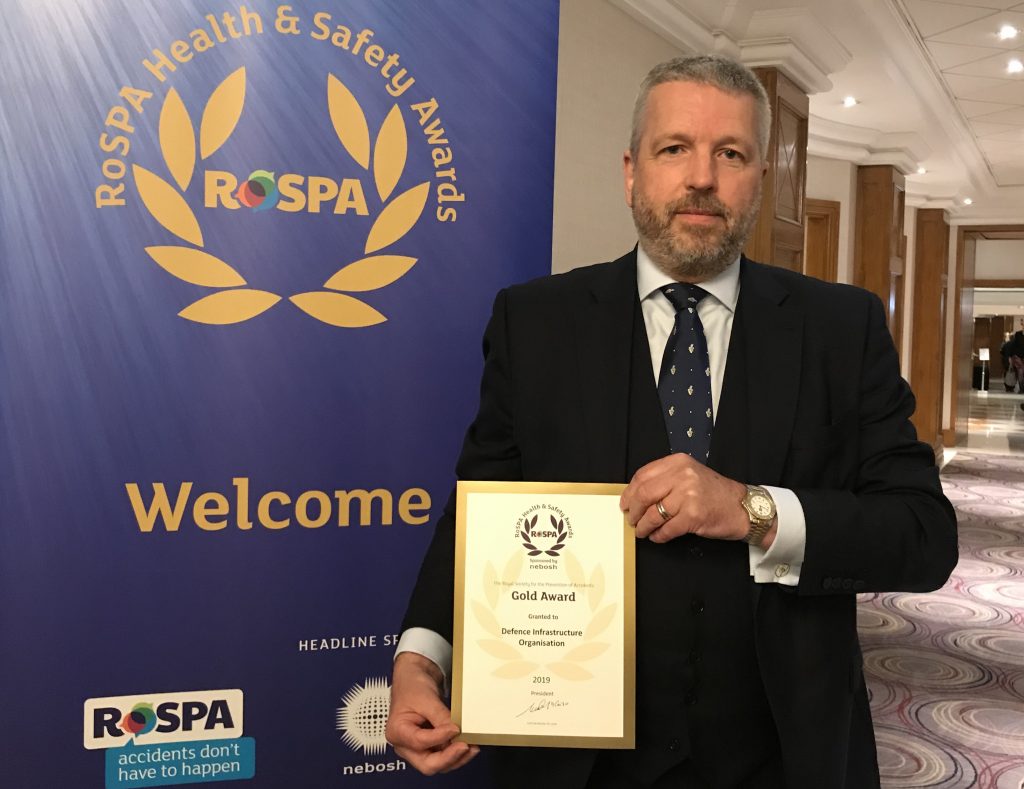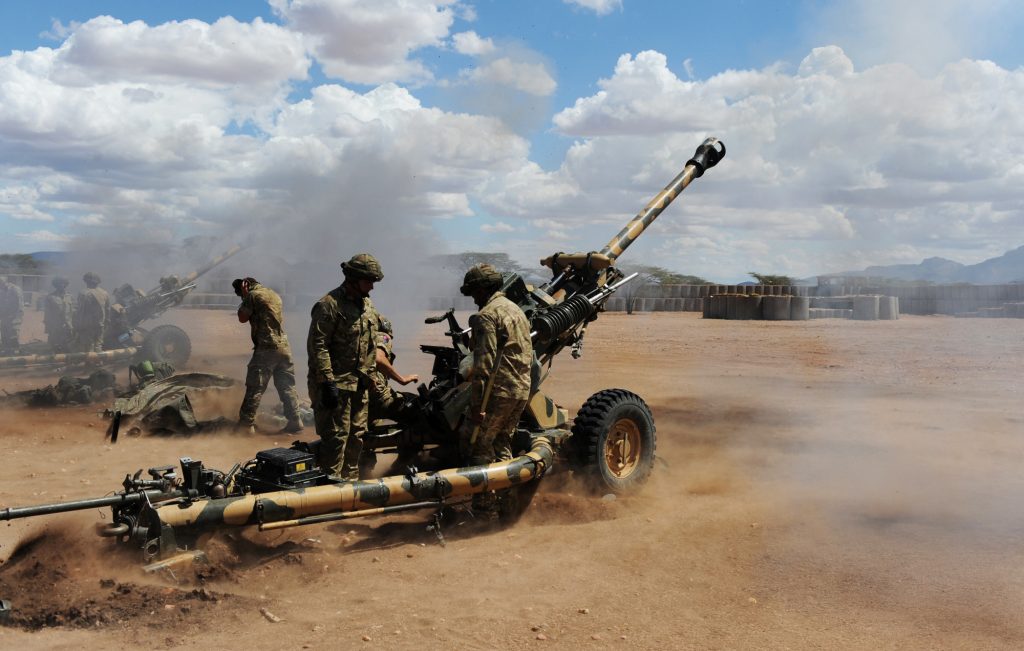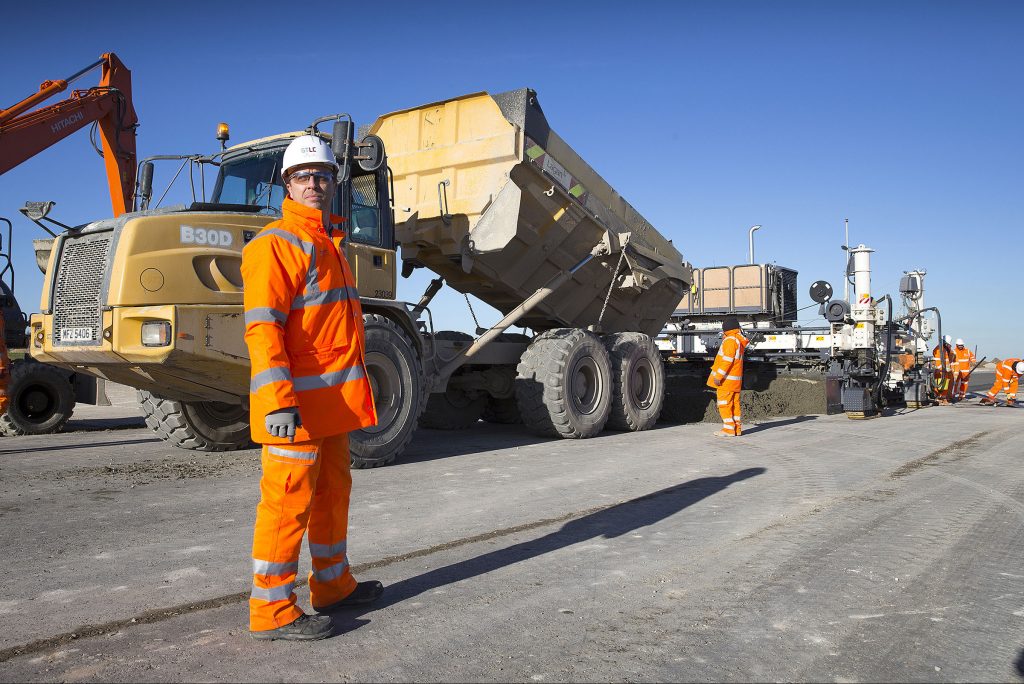
On Thursday I was honoured to collect DIO’s Gold Award from the Royal Society for the Prevention of Accidents (RoSPA). This is the third successive year we have been awarded the Gold Award, which is a terrific achievement for an organisation as large and diverse as DIO and represents real recognition of the work we’ve been doing on promoting a health and safety culture within the organisation.
Varied and challenging
When many people think of health and safety in a working environment, they’re probably thinking about offices. Of course, making sure office environments are safe is part of what we do, with everything from setting up desks and computers to prevent eye strain and repetitive strain injuries to making sure that everyone knows what to do in the event of a fire. However because of the range of what DIO does, health and safety for us is much more varied and challenging.
As well as offices, we’re also responsible for providing safe places for people to live, work and train, providing a range of facilities including military and family accommodation, technical facilities such as mechanical and vehicle workshops, airfields and construction sites. We also manage some more unusual facilities like ammunition depots, railways, power stations, oil and fuel depots and the MOD’s training estate. Much of our training land is open to the public when not required for military training and ensuring people are aware of the rules and do not enter these sites during exercises is a particular concern, as is the removal of any unexploded ordnance before sites are reopened to public access.
![A Lance Corporal in the REME (Royal Electrical Mechanical Engineers) is pictured welding a vehicle component in Afghanistan. [MOD/Crown Copyright2012]](https://insideDIO.blog.gov.uk/wp-content/uploads/sites/29/2015/08/Welding-in-Afghanistan-LCpl-in-REME-welding-vehicle-component-Sgt-Wes-Calder-RLC-Crown-Copyright-e1560178485281-1024x684.jpg)
We work with a huge range of contractors providing all sorts of services, including construction, maintenance, catering, cleaning, waste disposal and gardening. We insist that these contractors work to our own safety rules and regulations, so we can make sure everything is as safe as possible. On our facilities management and estates contracts, we require a monthly return reporting any near misses, accidents and incidents so changes can be made to reduce risk.
We don't just cover the UK either. DIO has sites all over the world, from Canada to Cyprus and Kenya to Nepal. Each presents its own challenges. In Canada for example, it can get very cold while in Kenya and Cyprus we face the opposite problem and people have to be aware of dangers such as heat stroke and dehydration. As recent tragedies have shown, in Nepal we face an earthquake risk.

As well as this, different countries all have their own health and safety legislation which we must abide by, but wherever these standards are lower than in the UK we always operate to the higher standard.
Expertise and innovation
With all of this to consider, we can’t sit on our laurels and that means having professional staff and constantly working to improve our performance. Most of the DIO Health and Safety team are members of relevant professional bodies and many have Chartered status. Some have specialist qualifications in areas such as working at height, dealing with asbestos, and Legionella management. These experts then develop compliance training for the relevant colleagues. The wider Technical Services team, of which the Health and Safety team is a part, includes recognised industry experts in safety critical areas such as airfields, nuclear, petroleum and working at height. DIO’s Fire Officer is the lead technical authority for Defence Infrastructure Fire Standards, which apply across the entire Defence Estate.

To achieve the RoSPA Gold Award for the third year in a row, we’ve had to keep upping our game. For example, in 2018 introducing Mental Health First Aiders was a big priority for us. Using staff volunteers, we now have 68 people across the organisation who are trained to provide a listening ear to any colleague struggling with mental health issues. Additionally, the Ministry of Defence Guard Service is testing our lone working arrangements to see how long it would take to get help to someone working alone if they fail to answer check in calls.
For the work in HMNB Portsmouth to refurbish jetties for the Royal Navy’s new aircraft carriers, we insisted the contractors test their man overboard drills in case someone had an accident and ended up in the water. Recently we’ve revamped our near miss reporting procedures by introducing a near miss reporting app. This means staff can more easily let us know if an accident has narrowly been avoided so we can investigate and take appropriate action.
VIDEO: 2019 RoSPA Gold Award win
Soon enough our Regional Health and Safety team will be starting to pull together the evidence to submit to RoSPA in the hope of being recognised with a fourth award in 2020. Thanks to the dedication and professionalism of the Health and Safety team, I have no doubt we’ll succeed.
